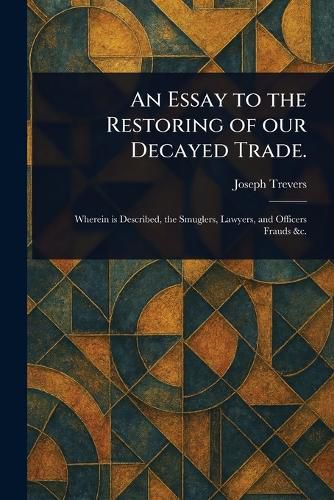Readings Newsletter
Become a Readings Member to make your shopping experience even easier.
Sign in or sign up for free!
You’re not far away from qualifying for FREE standard shipping within Australia
You’ve qualified for FREE standard shipping within Australia
The cart is loading…






This title is printed to order. This book may have been self-published. If so, we cannot guarantee the quality of the content. In the main most books will have gone through the editing process however some may not. We therefore suggest that you be aware of this before ordering this book. If in doubt check either the author or publisher’s details as we are unable to accept any returns unless they are faulty. Please contact us if you have any questions.
"An Essay to the Restoring of our Decayed Trade" by Joseph Trevers offers a fascinating glimpse into the economic landscape of Great Britain. This meticulously prepared edition explores the intricacies of commerce, trade, and the challenges posed by smuggling in an era defined by tariffs and evolving economic policies.
Trevers delves into the "Frauds &c." perpetrated by smugglers, lawyers, and officers, providing a critical examination of the forces impacting British trade. A valuable resource for those interested in economic history, this essay sheds light on the historical context shaping international trade and economic development. Explore the complexities of early commerce and gain insight into the issues that continue to resonate today. This historical text provides a unique perspective on the enduring tension between regulation and enterprise.
This work has been selected by scholars as being culturally important, and is part of the knowledge base of civilization as we know it.
This work is in the public domain in the United States of America, and possibly other nations. Within the United States, you may freely copy and distribute this work, as no entity (individual or corporate) has a copyright on the body of the work.
Scholars believe, and we concur, that this work is important enough to be preserved, reproduced, and made generally available to the public. We appreciate your support of the preservation process, and thank you for being an important part of keeping this knowledge alive and relevant.
$9.00 standard shipping within Australia
FREE standard shipping within Australia for orders over $100.00
Express & International shipping calculated at checkout
This title is printed to order. This book may have been self-published. If so, we cannot guarantee the quality of the content. In the main most books will have gone through the editing process however some may not. We therefore suggest that you be aware of this before ordering this book. If in doubt check either the author or publisher’s details as we are unable to accept any returns unless they are faulty. Please contact us if you have any questions.
"An Essay to the Restoring of our Decayed Trade" by Joseph Trevers offers a fascinating glimpse into the economic landscape of Great Britain. This meticulously prepared edition explores the intricacies of commerce, trade, and the challenges posed by smuggling in an era defined by tariffs and evolving economic policies.
Trevers delves into the "Frauds &c." perpetrated by smugglers, lawyers, and officers, providing a critical examination of the forces impacting British trade. A valuable resource for those interested in economic history, this essay sheds light on the historical context shaping international trade and economic development. Explore the complexities of early commerce and gain insight into the issues that continue to resonate today. This historical text provides a unique perspective on the enduring tension between regulation and enterprise.
This work has been selected by scholars as being culturally important, and is part of the knowledge base of civilization as we know it.
This work is in the public domain in the United States of America, and possibly other nations. Within the United States, you may freely copy and distribute this work, as no entity (individual or corporate) has a copyright on the body of the work.
Scholars believe, and we concur, that this work is important enough to be preserved, reproduced, and made generally available to the public. We appreciate your support of the preservation process, and thank you for being an important part of keeping this knowledge alive and relevant.